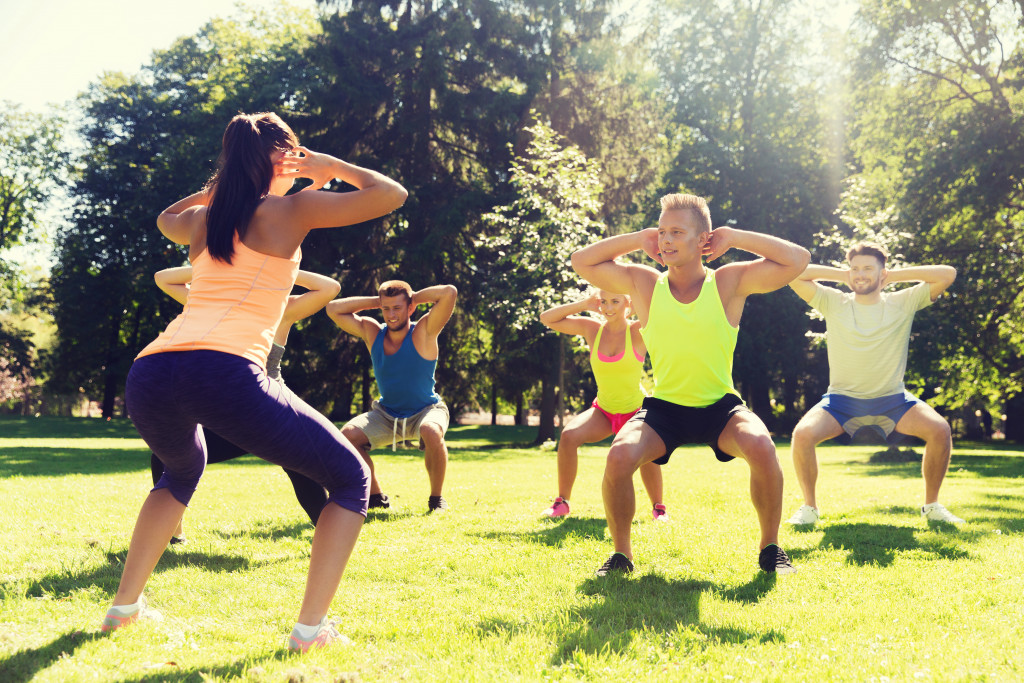• Working out outdoors offers great benefits, such as taking in the scenery and exploring new places.
• Hydration and sunscreen are key when working out outside, as well as wearing a hat and sunglasses to protect your face.
• Listen to your body and don’t push yourself too hard—take breaks when needed.
• Avoid exercising outdoors in extreme weather conditions such as heavy rain, high heat, or cold temperatures.
Another great way to get fit and stay active is to work outdoors. And if you’re like most people, you’ve probably been spending much more time outdoors lately. Working out outdoors has become a popular way to stay healthy and active. What used to be a quick trip to the gym has now become an outdoor adventure—and that can be great!
Benefits of Doing Outdoor Workouts
Of course, your aim for working out is to lose weight, build muscle, and stay healthy. But that doesn’t mean you can’t have a good time while doing it! Working out outdoors has some amazing benefits that the gym simply can’t offer.
- You get to enjoy nature and take in the scenery around you.
- You can change up your routine.
- It’s free, and you don’t need any special equipment.
- You can explore new places and discover new things about your local area.
- You can use the environment around you for your workout, like running on sandy beaches or climbing hills.
- You can enjoy Vitamin D from the sun.
- You get to be outside in the fresh air, which can help your mental and physical health.
Tips for Working Out Outdoors
Now that you know some of the great benefits of working out outdoors, here are a few tips on how to make the most of it:
Hydration is Key
Staying hydrated is important no matter what exercise you do, but it’s especially important when outside in the heat and sun. Bring plenty of water with you and take frequent breaks to drink it. You may also want to consider investing in a good quality reusable water bottle to keep your drinks cool for longer.

Wear Sunscreen
When you’re working out outdoors, it’s easy to forget about the sun—but that doesn’t mean it isn’t there! Wear sunscreen before heading outside, even if it doesn’t seem like a sunny day. This will help protect your skin from harmful UV rays and reduce your risk of developing skin cancer later on down the line. Choose a sunscreen with an SPF of at least 30.
Don’t Forget Your Face
When working out outdoors, your face is the most exposed part of your body, so wear a hat and sunglasses to protect it from the sun. Don’t forget to apply your favorite Vitamin C serum under your sunscreen. Vitamin C has antioxidant properties that can help protect your skin from sun damage and premature aging.
Listen To Your Body
When exercising outdoors, listen to what your body is telling you. If something feels wrong or uncomfortable, don’t push yourself too hard. It’s always better to ease into things slowly than risk injury by pushing yourself too far too quickly. Take breaks when needed, and if something still feels off after a few days of rest, head to the doctor just in case.
When to Avoid the Great Outdoors
Sometimes you don’t feel like it. And there are times that no matter how much you want to head outdoors, it’s not the safest option. Here are a few times when it’s best to avoid the great outdoors:
It’s Raining Heavily
Aside from making exercise uncomfortable, heavy rain can also make it dangerous. Slippery surfaces and flooding can both lead to falls and other injuries. Also, if you push yourself into exercise when the weather isn’t ideal, the risk of getting sick increases.
It’s Too Hot or Humid Out

Heat and humidity can both be dangerous when you’re exercising outdoors. If it’s too hot out, your body won’t be able to regulate its temperature properly, leading to heat exhaustion or even heat stroke if you push yourself too hard. Remember that heat does not contribute to fat burning, so it’s best to do your outdoor workout in the early morning or later evening to avoid the heat of the day.
It’s Too Cold
Exercising in cold weather can strain your body greatly, leading to injuries and even hypothermia if you’re not careful. So if the temperature drops too low or the wind chill is too strong, it’s best to stay indoors and look for other ways to get your workout in.
Working out outdoors can be a great alternative to hitting the gym—make sure you’re prepared and protected before heading outside! With these tips, you should have no problem making the most of your outdoor workouts.




